-Introduction-
At last we’ve made it to Anime Rants’ analysis of the last arc in Revolutionary Girl Utena, The Apocalypse Saga. Despite only being six episodes long, this final saga has a ton of content to unpack. So be prepared for a post of the usual length as the other RGU analyses. Below I’ve included links to my previous posts in this series. With that, let’s get started.
The Student Council Saga (Arc 1 Analysis)
The Black Rose Saga (Arc 2 Analysis)
The Akio Ohtori Saga (Arc 3 Analysis)
-The Tale of The Rose-

The Tale of The Rose is the play put on by the shadow girls A-ko and E-ko in episode 34. It’s one perspective on the story of Akio and Anthy. The tale goes something like this. Once upon a time, all the girls of the world were princesses. When they were in trouble or feeling down, they were saved and empowered by the Rose Prince. The world was beautiful because of the way the Rose Prince helped the girls. The Rose Prince was the light of the world. However, an evil witch tricked the Prince into coming into her lair. She sealed him there, keeping all his light to herself, and the world fell into calamity. That’s why the world today is such a grim place. Beware, because the Witch still exists somewhere in this world.
This is the version of the story that is generally known and accepted by the people inhabiting the world of RGU. The Prince was obviously Dios, and the Witch was Anthy. But as we quickly learn, this tale is full of issues; that’s not how things really went down. What actually happened was that Prince Dios was sick and dying. The people needed him, but if he went out again to fight, he would die for sure. So Anthy decided to take the blame and hatred of the world onto herself to save her brother. She faced the people of the world and told them she was a witch who had sealed away the power of the Rose Prince. The enraged people tried to kill Anthy, but she, being a witch, could not die. The world’s persecution and hatred stayed on Anthy, and she remains the eternally suffering sacrifice.
The true tragedy of the story, at least for Anthy, was not even the fact that she is immortal and forever in pain. It’s the fact that Prince Dios still “died” despite her actions. All that was left was her brother Akio, who grew into a manipulative and abusive man. This brings up the first really interesting point of discussion. What was Dios, and what was the nature of his life and supposed death? Did he really die, and if so, why?
-The Prince Concept Revisited-
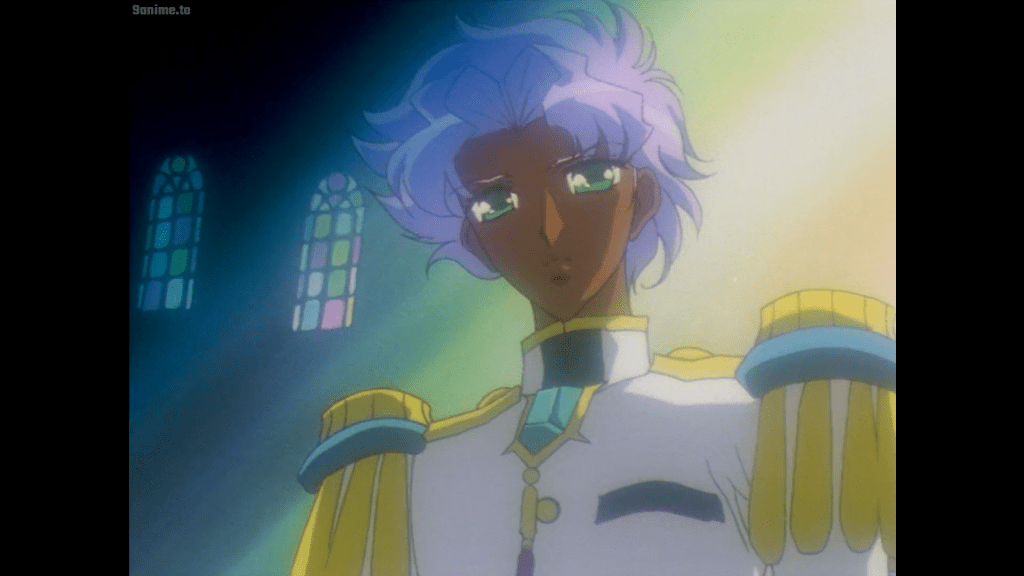
Here are my thoughts on the matter. The Rose Prince, AKA Dios, has always existed as a concept. He is a symbol of strength, courage, and altruism, as well as hope and empowerment for young women. At one point, Akio was very close to the embodiment of the Rose Prince. But he was never exactly or completely Dios the concept. Akio’s power, in my opinion, comes from Anthy’s worship of him. Anthy loved her brother more than anything, and put him on a pedestal as her prince and the light of the world. But Akio was human, and he kept drifting away from his likeness to the Prince. That’s the “illness” of Dios. It’s the image of Anthy’s perfect prince slipping away from her grasp.
As the image crumbled, the spirit of Dios that was in Akio effectively died. The Rose Prince still exists as a concept, and in the fantastical world of RGU, his powers to bring light to the world probably also exist. That’s the power Akio is after, as well as the power that naturally falls on Utena when she acts like a true prince. So technically speaking, Dios is only dead within Akio. In the previous arc, Akio basically revealed that he wants to go back to being what he was, but cannot. He is a fallen angel; hence the reason he showed Utena the morning star and talked about the myth of Lucifer. Some part of Akio knows he isn’t whole, isn’t right. That’s why he wants the Prince’s power. But as long as he abuses and manipulates people around him to get that power, he will never actually grasp it.
Note: If you go back to the second arc, the Black Rose Saga, you can see Akio talking to Dios and relating the stories of the duels Utena has won so far. Dios, effectively Akio’s younger self, glares at him. Akio mocks the young prince and remains assured that he will unseal the power of the prince by using Utena. This all makes sense now, knowing what we know from Apocalypse Saga.
-The Witch and Other Anthy Theories-
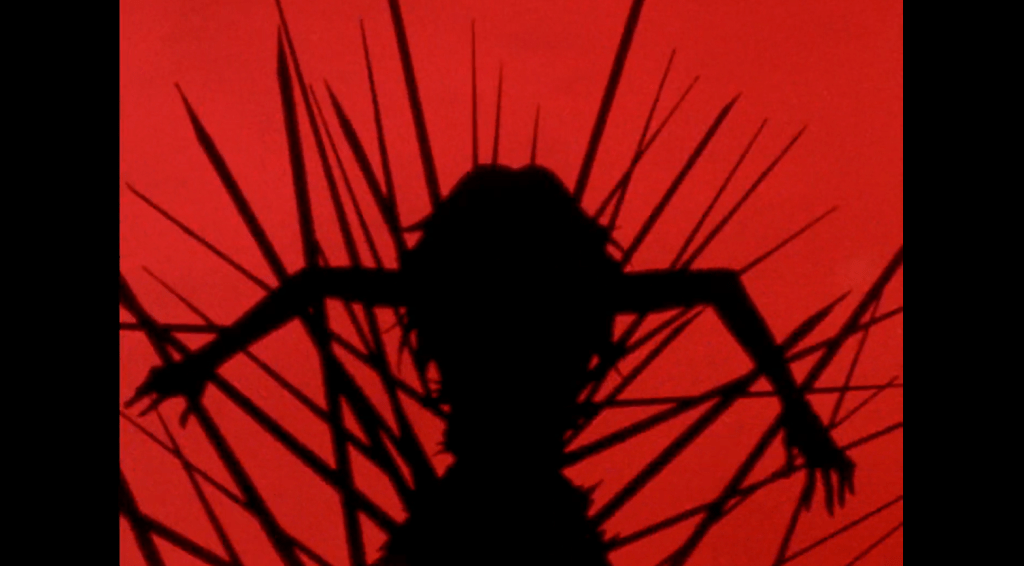
Going back to the Tale of The Rose, we know Anthy is considered a witch because the world hates and misunderstands her. But is there any more to the Witch concept than that? What exactly is Anthy? And on a related note, if Dios died, why does Anthy continue serving Akio and taking his abuse?
To answer the first question, I would say yes, a little. There is a bit more to the idea of Anthy being the Witch. Although all of it has been under command of Akio, Anthy has done a lot of harm to others. She traumatically betrayed Utena in the first arc, manipulated Mikage with an illusion for the second arc, and continued helping Akio manipulate duelists in the third arc. And as we know from apocalypse saga, Anthy betrays Utena again at the worst possible moment. I don’t think Anthy is evil or anything like that, but I think sometimes, she acts the part. She believes she has no choice, and in many cases, it would have been extremely dangerous for her to try resisting. All I’m saying is that these are excuses for people to strengthen within their minds that Anthy is some evil Witch.
But what exactly is Anthy? Well, there isn’t a clear, certain answer that everyone agrees on. We do know that Anthy and Dios appear Indian and have references to Indian culture with their wardrobe and such. (For example, Anthy’s dress is red because high-class Indian women wore dresses for their weddings.) Some believe Anthy and Dios are supposed to be deities among the other Hindu gods. Others will say they are Indian because the show RGU reflects themes related to Hinduism. There is also a theory that Anthy and Dios grew up in British-colonized India.

Clearly, there are many hypotheses about Anthy. All we know for sure is that she is a feminine being with great power. It makes sense that those who fear her would consider her a witch. But we haven’t even gotten to the most interesting thing about Anthy with relation to Dios. There is one theory (which I agree with) that says that Dios was created by Anthy and only has any power because of her. In the movie, Dios the Rose Prince never existed, but was just a puppet with the real power coming from Anthy.
In addition, think about Dios the concept. He represents the true Prince with virtues of courage, altruism, and empowerment. We’ve also discussed in past posts that sacrifice is an important part of the Princely Spirit. At the end of RGU, Utena sacrifices herself to save Anthy from the swords of humanity’s hatred. That made her a true prince. But long before that, Anthy sacrificed herself to save her brother. Nobody is better at being a prince than Anthy. I love this interpretation.
-Coffins-
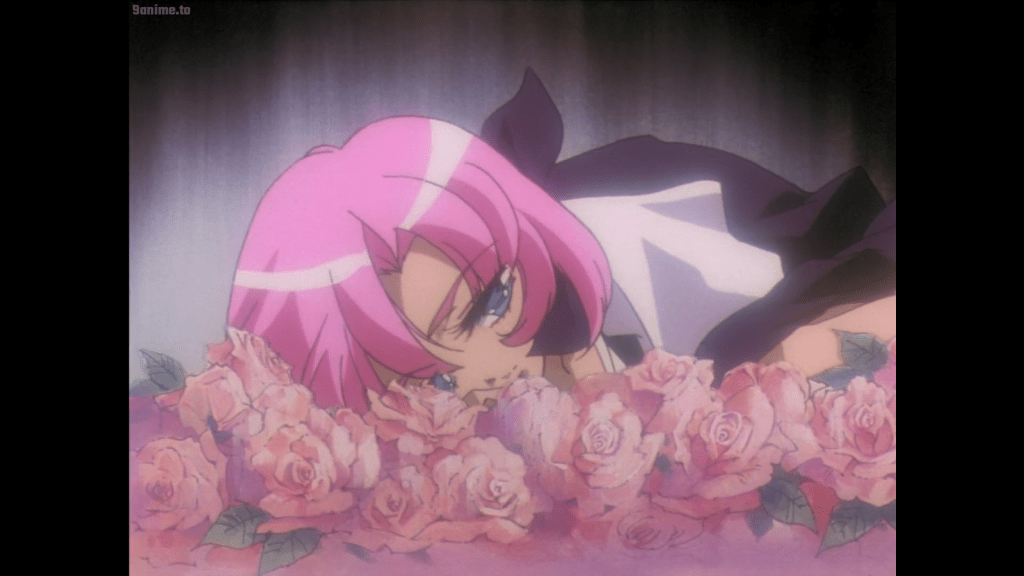
In the last arc of Utena, Saionji and Touga again recall that they found Utena in a coffin years before, when she was grieving her parents. Saionji states that Utena is still in her coffin, and in fact, everyone is. We are all still in our own personal coffins. When Utena rescues Anthy in the last episode, Anthy is inside a coffin. What is with all the coffin imagery? What does it mean?
One interpretation is that coffins represent what is holding us down. Utena went into her coffin when she had given up hope. She wished to never again leave. Anthy is depicted in a coffin because her position as the Rose Bride and the Witch keeps her there. Everyone has a coffin where they are trapped, and they need someone else to open it up and drag them out again. An interrelated idea is that coffins are emotional comfort zones, where we feel safe, but we never change. Rising from the coffin is necessary to get our lives moving again. Alternatively, the coffins are metaphors for society’s roles imposed upon everyone. The roles are especially bad for the women, for Anthy and Utena, who are subject to misogyny. But everyone has their own coffin, as Saionji pointed out.
Another idea of the coffin’s meaning is the world of RGU itself. If you remember, Touga has always referred to the world as an egg. “If we cannot break the world’s shell, we’ll die without being born.” The egg metaphor is basically the same as the coffin. To break out of the world of RGU, which is controlled by the system of dueling and such, one must have extreme willpower and the help of someone else with equally strong willpower. Once the shell is broken, or the lid is lifted, it can never be undone. The world will be revolutionized. We will be born as free beings. At the end of RGU, Utena opens Anthy’s coffin for her. This sets Anthy free so that, in the movie, she can act with agency and be free of Akio’s control. Then Utena and Anthy run away from the crumbling world together, finally set free.
-Touga’s Love and The Cactus-
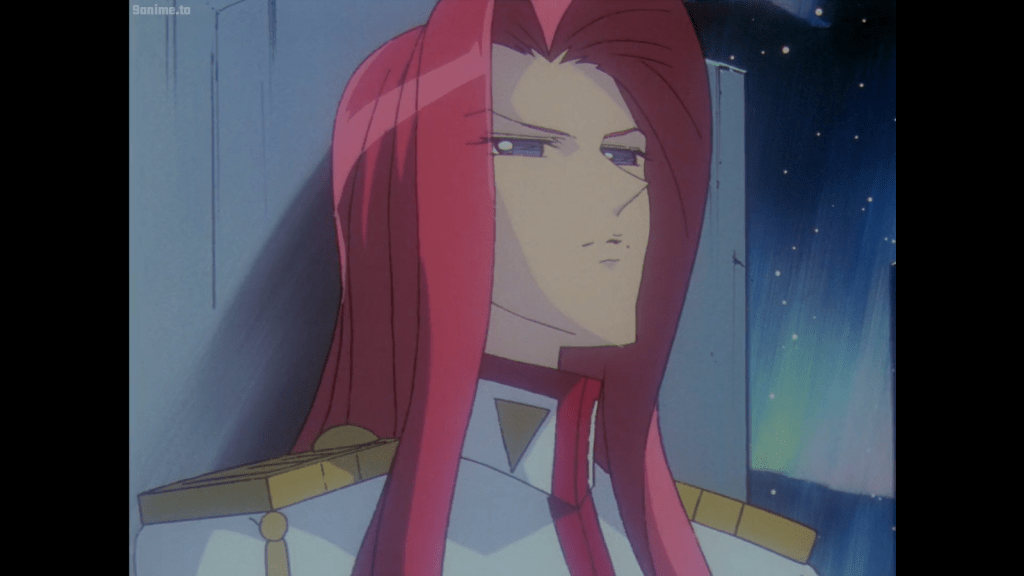
Over the course of the anime, Touga has fallen in love with Utena. He starts becoming aware of it in the Akio Ohtori Saga. During one of their car rides, Touga tells Akio he has fallen for Utena because she is a girl who shook him and his views to the core. However, he continued fooling around with many girls at school while making no move on Utena. In the Apocalypse Saga, Touga must finally answer the questions of whether he’s in love with Utena, and if so, what does that mean for him?
After verifying that he does indeed care about Utena, Touga also realizes that she is falling into Akio’s hands. He realizes that to “save” Utena, he needs to fight her again and take her place as the one to revolutionize the world. He’s not doing it to win Anthy or for some world-changing power, but only to save Utena from pain. The reason that Touga started admiring and copying Akio was that he saved Utena so long ago.
Before you go thinking that maybe Touga is a good person after all, remember the conditions of his challenge in the final duel. If he loses, the student council leaves Anthy alone for good. If he wins, Utena will become “his woman.” That proves that Touga is still deeply flawed and selfish. Even if he does have genuine feelings of love for Utena, it would be wrong of him to force her into being his partner. And even if she was his partner, that wouldn’t make her Touga’s property. Even if he is the closest to being princelike in certain ways, Touga has a long way to go.
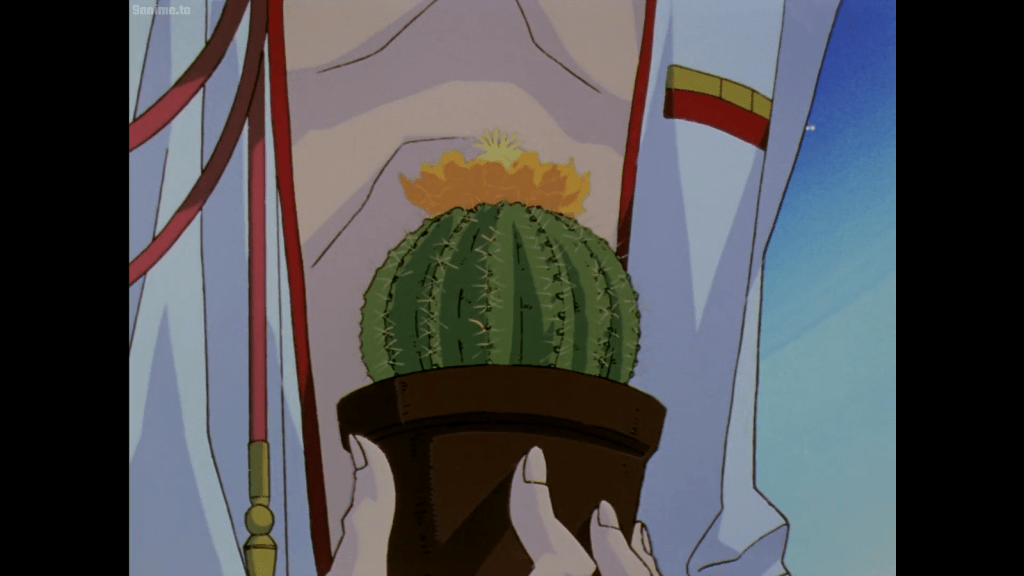
In several scenes related to Touga, we see him holding plants. It’s usually a flowering cactus. In one scene, he’s holding a carrot, and to be honest, I don’t understand that. However, the cactus flower makes a little bit more sense. Flowers in general symbolize love and sexuality in Japanese culture. Their species and colors have different meanings in Hanakotoba, the language of flowers. On one scene where Touga and Akio are talking, there’s a bunch of potted cacti around. A cactus with a red flower is shown when Touga is thinking about Utena. Then a cactus with a yellow flower is shown as Touga’s reaction to Akio talking about Utena. Red flowers usually mean romantic feelings and sexual desire, while yellow flowers symbolize jealousy or envy. So the flower color reflects what Touga feels.
There’s another interrelated meaning to the cacti in that one scene. It’s about genuine feelings of love versus people you use for pleasure. Akio is surrounded by many cacti pots; he has many lovers and partners. However, not a single one of his cacti have flowers. Touga only has one cactus he holds close to him, and it does have a flower. That symbolizes his genuine love toward Utena, the only partner he truly wants.
-The Badminton Scene-

There’s a scene in episode 37 where Utena plays badminton with Juri and Miki. Nanami is also there. It’s a great scene because it shows there’s no hard feelings between them and how their lives have changed. The revolution in the school has begun. There are a number of other little insights in that scene as well. Let’s start with Juri and the way she and Utena talk about their respective loves.
After talking about how she can’t free herself from her love for Shiori, Juri asks about Anthy. She asks if Utena loves Anthy. Utena confirms that she does, but at first, she tries to make her love seem better than Juri’s. Utena says her love for Himemiya is different because it’s “pure.” But she quickly realizes this is insulting to Juri and she takes it back, saying Juri’s love is pure too. So in the end, by Utena’s own admission, there is no difference between the way Juri loves Shiori and the way Utena loves Anthy. This was important to see and hear because it’s a rare confirmation of Utena’s feelings. Japan is still quite homophobic. So it’s really neat when the characters in anime allude to being LGBT+. (In real-life terms, Juri is probably lesbian and Utena is bisexual.)
Next let’s look at the way everyone’s lives have changed as a result of their experiences alongside Utena. Although Juri says she still isn’t free of Shiori, she is making progress in that direction. She asks Utena if she can have her picture to put in a new locket. That’s not only proof of Juri’s growth, but also of the fact that Juri feels affection toward Utena. For Miki, it’s similar. He isn’t so hung up on Anthy anymore. He even half-jokingly says he’s interested in Utena now. Meanwhile, Shiori and Kozue watch Juri and Miki from a distance. Their lives have begun changing as well.
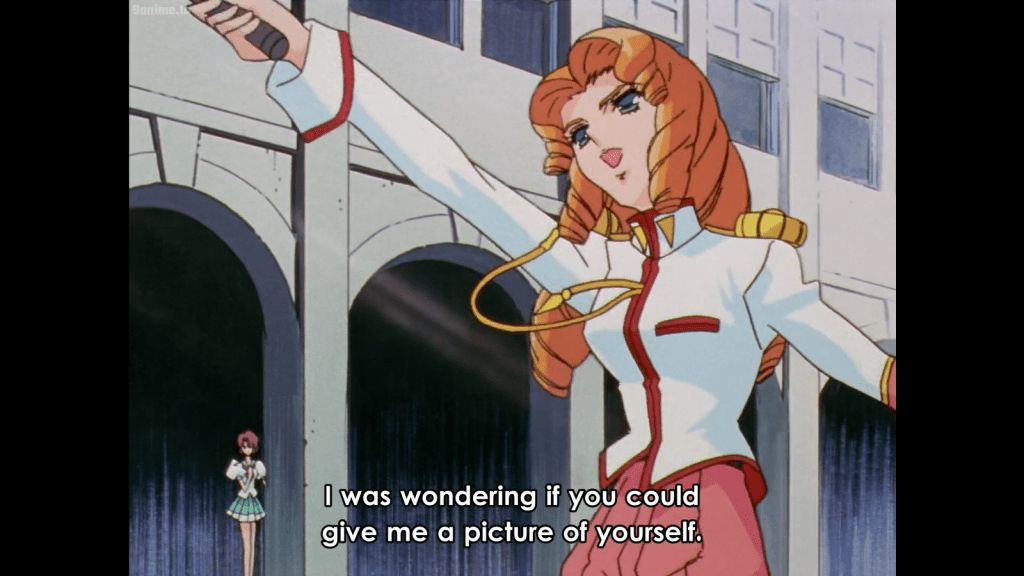
Nanami has also grown immensely. She appears on the scene dressed in the normal school uniform instead of her yellow student council uniform. When asked, she says she has quit the student council. It’s also possible that she might transfer away; she mentioned so late in the Akio Ohtori Saga. These are signs that Nanami is outgrowing her obsession with Touga. She also has little or no hostility toward Utena anymore. Nanami even takes the time to warn Utena to be careful of Akio and Anthy. Interestingly enough, this little conversation leads to the realization that Utena and Nanami are the same blood type (B). This seems to be something they appreciate about each other, despite it having no real effect on anything.
All in all, this badminton game is a scene that feels good to watch, showing how the characters are changing. There isn’t as much clear evidence of Touga or Saionji having changed positively, but I think they are also beginning on the right track now– or a better track than before. They are seen riding bikes together and driving in a motorcycle with an attachment on the side. This suggests they are no longer spending as much time with Akio. Instead of being driven around in his car, Saionji and Touga are trying to start moving on by themselves, and in their own ways.
-Anthy’s Suicide Attempt-
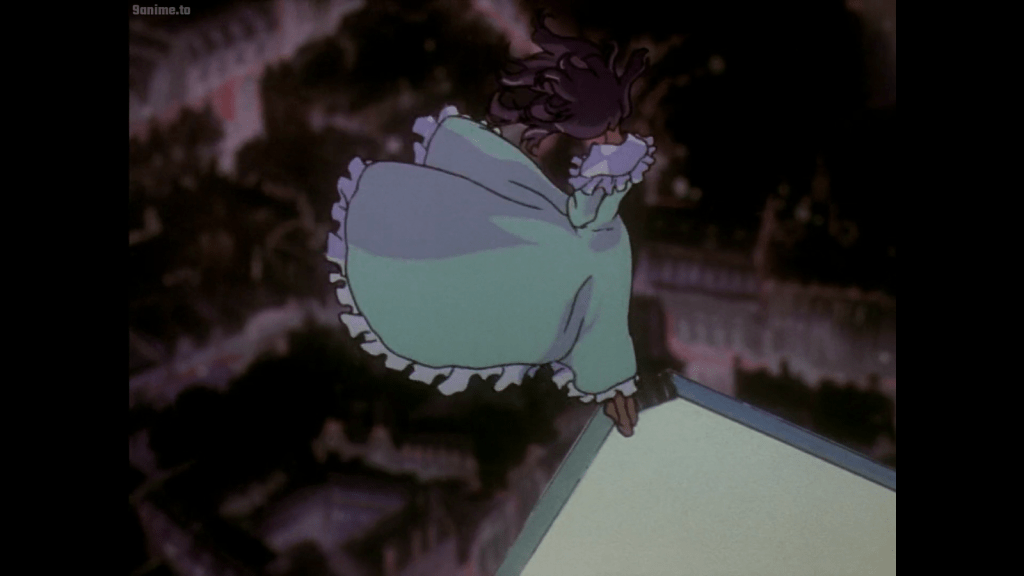
Late in episode 37, there is a sudden and dramatic scene showing Anthy about to throw herself off of Akio’s tower. Utena pulls her to safety. This brief scene isn’t even discussed again until episode 38, when it is shown in more detail. I wanted to go over this scene and what it means. To understand, we have to go back just a little to get a sense of how Anthy and Utena are feeling about each other.
Note: It is stated that Anthy cannot die, so it’s possible no suicide attempt would be successful. The point is that Anthy has probably never tried to kill herself like this before. Now, she’s been pushed to the edge and is willing to try. Even if she went through with it and survived due to immortality, the desire for death still tells us a lot about Anthy is going through.
After Utena discovered that Anthy and Akio were sleeping together, she was shocked and had some mixed feelings about Anthy. But ultimately, this discovery opened Utena’s eyes to what kind of man Akio was. Any bad feelings toward Anthy subsided, and Utena bonded with her even more. The scene where Utena rips up Akio’s letter is telling. She cares much more about her relationship with Anthy than with Akio. For Anthy’s part, she was also growing closer to Utena. She even said she wished they could keep living together forever. Given all this, things between Anthy and Utena were strong and going well. When they had tea and cookies together that one night, they held hands and promised that no matter what, they would both be around to do this again in ten years.
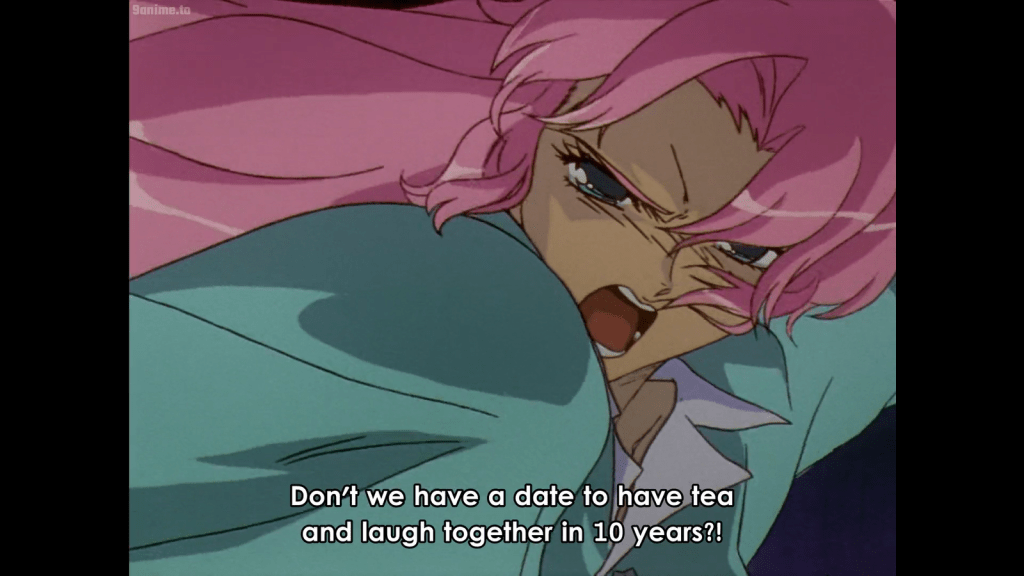
If the relationship between the girls was this strong, why did Anthy try to kill herself that night? I think there were two main reasons. First of all, we know Anthy lives suffering through constant pain. The swords of humanity’s hatred are always stabbing her over and over again. She is hated by the world. The constant agony felt like too much to handle, so of course Anthy wished to die. The second reason is that Anthy felt guilty for using and manipulating Utena for so long, and/or standing back and doing nothing while Akio did the manipulating. There are several scenes in the Akio Ohtori Saga where Anthy comes close to telling Utena the truth, but backs out at the last moment. There are also scenes of her watching Akio’s progress with Utena. All along, she probably wanted to interfere, but could not defy Akio. And since she loves Utena, on some level, the guilt is now crushing her.
Anthy basically admits to this when the scene is extended in episode 38. She tells Utena she has cheated, used her, and betrayed her since the very beginning. Utena, for her part, admits to playing prince for her own ego and never even noticing the terrible pain Anthy was suffering. Both girls admitted their shortcomings to each other and cried over it. Anthy’s suicide attempt was important to establish this clearing of the air. Utena now has a motivation to go to the castle and fight Akio– to save Anthy from the role of the rose bride and its accompanying pain once and for all.
-Interpretation of The Ending-

What happened at the end of RGU? My theories and interpretations are as follows. The way to revolutionize the world– to open the Rose gate– was not completed. The sword of Utena’s soul could not break the gate. Akio knew he would get it eventually though, so he wasn’t worried. Utena, in her nearly dead state, crawled to the gate, which had become a coffin. She opened the coffin, found Anthy inside, and freed her. By removing Anthy from the coffin and taking the swords of humanity’s hatred into her own body, Utena sacrificed herself to save Anthy. As a result, Utena temporarily disappeared. The school soon forgets about her as the duels restart and the cycle of the RGU world begins again. Only one thing has really changed. Anthy now has much more freedom, and has decided to find Utena and save her in turn. The series ends with a confident Anthy leaving Akio to search for Utena.
Now let’s expand on what I outlined above. Why couldn’t Utena’s sword break open the rose gate? The answer is simple in my opinion. The sword didn’t work to its full potential because Akio pulled it out of Utena and used it. For it to work, Anthy would need to pull it out of Utena, and Utena herself would use it to open the gate. What are the swords of humanity’s hatred? Those are the will of the world to suppress Anthy– and women in general– and demonize her as a witch. What about the coffin Anthy was in? Coffin symbolism has been used throughout Utena and was already discussed earlier in this post. But to put it simply, Anthy is in a coffin because she feels dead inside and wishes for death (in the same way Utena did after her parents died).
Now we get to some really interesting questions. What is the nature of the Utena world, that people forget each other and begin doing the same things over again? I believe the world of RGU within the school is much like a time loop. The same basic events happen over and over, like in a play. The same characters repeat their roles. It’s probably only Anthy and Akio who are aware of this. They seek the way to change the world, to break the egg shell so to speak. Nobody in the closed world of the school ages. (The theme of repetition is strong throughout the series, culminating in the imagery of Prince Dios riding the merry-go-round in the final episode.)
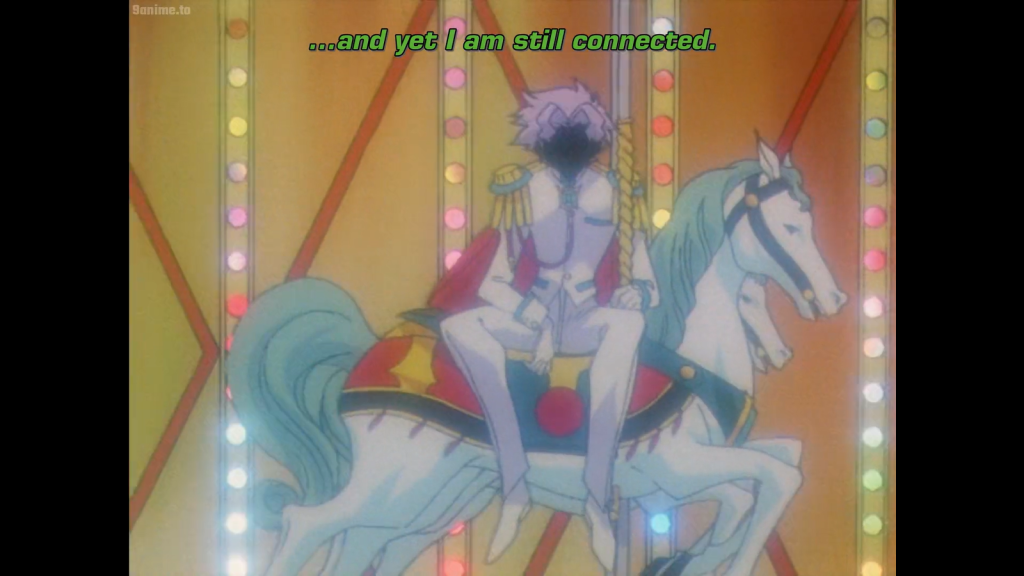
Who knows how many times the duels have happened? Who knows how many times Utena came to the school and found Anthy? Given the weird nature of this closed world, other strange things happen as well. There is Anthy’s magic, a very real force. There are spirits of the dead walking around thinking they are still alive, like Mikage in the Black Rose Saga. Even Touga isn’t real or alive if we include the movie’s version of him.
Importantly, there is an outside world, and we saw at least one person from it (Mikage’s love interest who had aged over a decade and found that nobody else had aged.) The way to revolutionize the world is probably to break apart the repeating cycle. Another option is escape from this closed world. In the movie Adolescence of Utena, we see the cycle repeat. But this time, Anthy has control, and Akio dies soon into the cycle. As a result, Utena and Anthy’s love is unhindered. They break free of the frozen world and escape Akio’s influence forever. The others left behind– Saionji, Miki, and Juri– suggest that they will follow soon. The world will soon be revolutionized, or broken apart, to reveal the outside the world.
A few questions remain unanswered. What happened to Utena at the end of the series? There are several options. She died, and the Utena we see in the movie sequel is a newly reborn version of Utena. Or she was simply out of commission for a while, recovering, and losing her memories. Alternatively, she went to another world, another version of the RGU world we know. It’s possible that Anthy followed her there. The world they arrive in is the one in which the movie is set. Whichever interpretation you chose, the spirit of Utena has been reborn. It’s still her, the good old Utena we know and love. Or so I will argue.

-Closing Thoughts: Revolution-
Before closing I wanted to point out two things. First we have an insight about RGU shared by my friend Nat, who helps me write my Utena analyses. Nat has observed that fact that the word revolution has two meanings. The first meaning is to break apart, and the second meaning is to turn in a circle. Both meanings fit the series of Revolutionary Girl Utena. The characters are trying to break free and “revolutionize the world,” while it repeats in cycles. This double meaning is extremely neat if you ask me.
The last thing I want to point out is that this isn’t quite the end of my Utena Analysis posts. There’s still one more I want to do. That post will be a much more generalized thematic analysis of RGU as a whole. It will include over-arching themes that I may have skipped over in these posts, such as theater and the shadow girls. In addition, I’ll review themes that I’ve already mentioned but are worth pointing out again, such as LGBTQ+ elements and misogyny. Look forward to that post in the net few weeks or months.
That wraps it up. I know it’s sappy to say, but let’s all keep fighting in our own ways, like Utena, to revolutionize the world. Maybe you can be a prince for a captive rose bride, or maybe you can be a rose bride fighting to accept the love that can change your destiny. Thank you for reading.
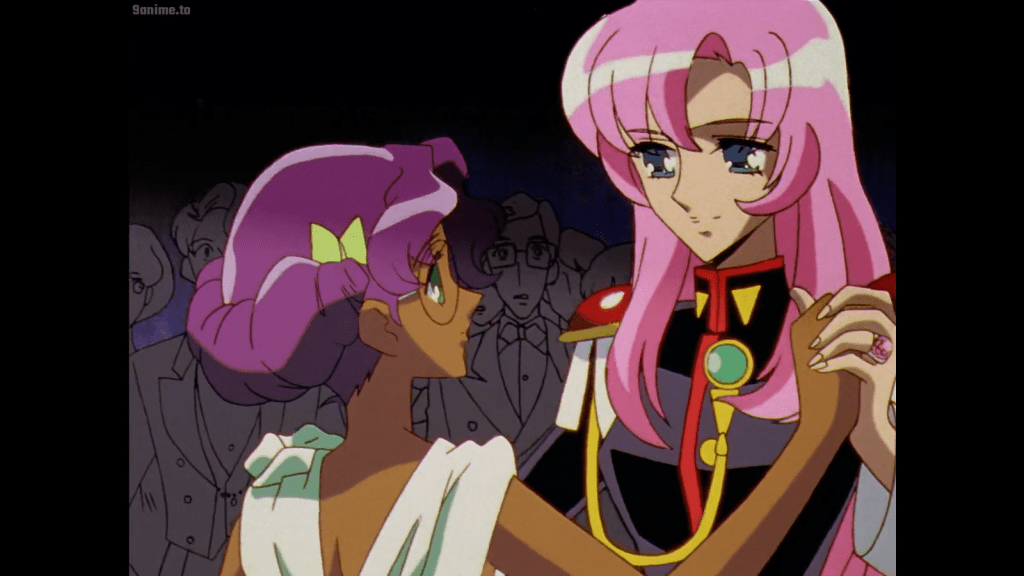

Wow, this story arc is so complex, it’s hard to even wrap my head around it! Thanks for explaining it, I don’t think I would even begin to understand this with out a little commentary!
LikeLiked by 3 people
Glad it helped! 🙂
LikeLiked by 2 people
Wow. This has stirred up a lot of emotions in me again. The way you made sense of it all and put it together in a comprehensive way, simply amazing! Thanks for including me in these. And I look forward to reading more!
-Nat
LikeLiked by 2 people
Thanks for your help as always ❤
LikeLiked by 1 person